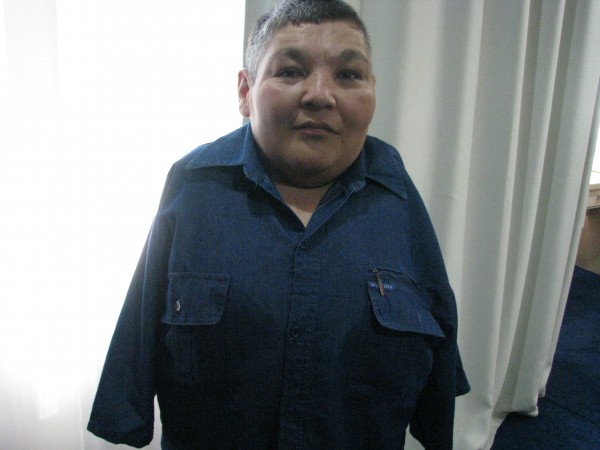This is an English version of the special interview with Karipbek Kuyukov on August 30, 2012 in Astana, Kazakhstan during the Parliamentarians for Nuclear Non-proliferation and Disarmament conference. The original Japanese version is on the interview section of Nuclear Weapon & Nuclear Test Monitor, a biweekly journal by Peace Depot. The original English version is available here. The text below has been slightly edited by Pressenza. This interview appears courtesy of Maria Kim of Peace Depot, Japan.
“Between 1949 and 1989, the Soviet Union conducted nuclear tests 468 times in Semipalatinsk, Kazak Republic (Semey city, Kazakhstan). In 1968, I was born without arms in a village about 100km from there. When I became an elementary school student, for the first time was I told by a doctor the reason why I didn’t have arms was because of radioactivity. I reasoned that it was my fate, so let’s embrace the reality.
During the 44 years of my life, of course, I have felt desperate several times. Especially when I graduated from high school, I could hardly find a hope for my future while I compared myself to the normal lives of others who could get a job and get married. Now I am speaking while laughing, but at that time it was quite sad for me that I couldn’t go to the discotheque like other boys. Also, even though I tried to enter an art college – 3 times – I was rejected with the reason that they couldn’t provide special facilities only for me. I felt discriminated somehow. But in the end, I accepted it as my fate and moved to Zagorsk to start work.
My parents, my best supporters, encouraged me a lot always saying, ‘you should be strong.’ Without the comfort of my father, I would not have overcome the shock of being told that I won’t be able to become a father. And he gave me a chance to study in Russia since I became an elementary school student. So that, I could study in St. Petersburg until 3rd grade, then move to another special support school at Oryol when I entered 4th grade. Also, my father who hoped that I would be able to use prosthetic arms sent me to a special robot institute in St. Petersburg. Even now I clearly remember when I made my own trip from Kazakhstan to Russia as a little child. Since my early years, I was eager to make paintings, using my feet. As a result, my back started to become bent; I was dressed in a corset to immobilise my spine. Finally, I decided not to use both items any more. The prosthetic arms were too heavy and needed to be replaced every time I grew. And the corset disturbed my breathing while sleeping and my drawing as it stopped me bending my body as I wanted. I was 13 years old then. No matter what the result was, I really appreciated my parents for having exerted themselves to the utmost to bring me up with love and care. In those days, there were so many deformed or disabled children in Semipalatinsk, and most of them were shut indoors and couldn’t go out. That was because their parents thought their children brought shame to the family. In this regard, my parents were extraordinary.
One day in my 4th grade, in a hospital room, I met a middle-aged man who had lost his arms in a fire. Because he was used to life with arms till then, he struggled with even simple movements, but he could draw pictures with his mouth so skilfully. Also, he didn’t get depressed or lament his misfortune. That man, whom I met at a young age, allowed me to dream and hope for the future.
My parents are no more with me. In March 2011, my father passed away from a stroke, then my mother followed him eight months later. In addition, she suffered with colon cancer caused by the effects of radiation over a long period of time. Despite the loss of my best supporters, I dream and have hope which allows me to live resolutely. This comes from my strong belief in the future. Kazak culture puts the highest value on carrying on the legacy. Though I don’t have my own son, my deceased brother has left his only child in my family. I am reassured believing that my nephew will succeed the legacy of family. And, my dream is that, the next generation will be free from fear and suffering due to radiation. I have raised funds through the exhibition of my drawings at various places in Kazakhstan. With those funds, I have bought medicine and clothes in order to support the children in Semipalatinsk. Moreover, recently I’ve just started working as an Honorary Ambassador for the ATOM Project, an online petition for abolishing nuclear tests, launched by the Government of Kazakhstan. I believe that the aim of the project and my dream are on common ground. Please enter the homepage, watch the pictures of children, and sign the petition.
Last year, another radiation accident occurred again in Fukushima, which shocked me so much that I couldn’t help but cry as I watched the disastrous sight on TV. To the victims of Fukushima and all the people of Japan, I hope you have strong minds. I feel such a pride for the Japanese people who overcame the atomic bombings of Hiroshima and Nagasaki, and succeeded to rebuild their society. The difficulties must be conquered. And time heals all wounds.
My readers, if I could find a smile even on one person’s face among you, my goal for today has already been accomplished.”










